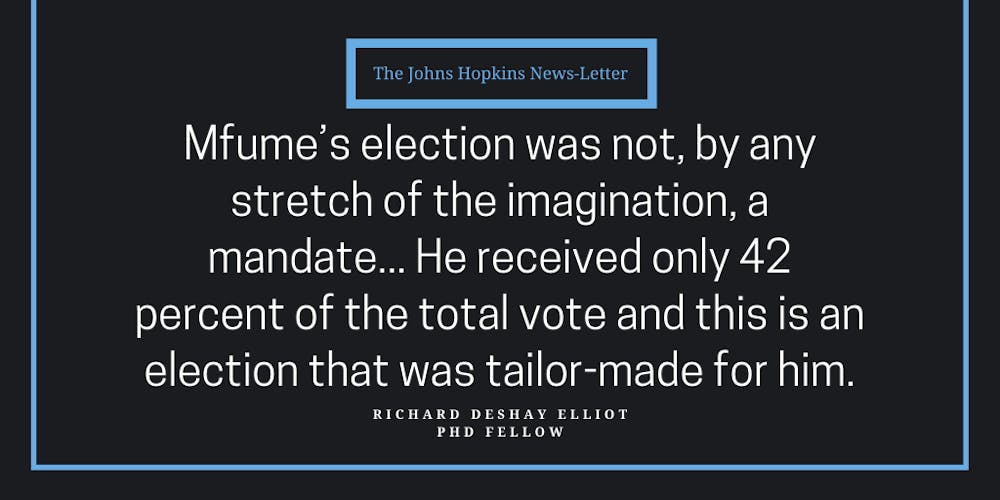Democrat Kweisi Mfume and Republican Kimberly Klacik won their respective special preliminary elections for Elijah Cummings’ former 7th Congressional District seat on Monday. Mfume was one of 24 Democratic candidates and Klacik one of eight Republicans running for the seat left vacant after Cummings’s death in October 2019.
Mfume held the 7th Congressional District seat for five consecutive terms from 1987 to 1996, but stepped down from the position to run the National Association for the Advancement of Colored People from 1996 to 2004.
The special election did not determine which candidate will serve out the two-year Congressional term. Instead, this will be determined by the regularly scheduled primary and general elections on April 28 and Nov. 3. The winner of the special general election, also on April 28, will serve out the remainder of Cummings’ term, until January 2021.
In an interview with The News-Letter, Richard DeShay Elliot, a PhD fellow and campaign manager and senior policy advisor for State Senator Jill P. Carter, suggested that another change in Congressional seating was highly likely. Carter received around a sixth of the vote in the special election.
“Mfume’s election was not, by any stretch of the imagination, a mandate,” Elliott said. “He received only 42 percent of the total vote and this is an election that was tailor-made for him.”
Elliot explained that those voting in the special election were “super voters,“ meaning that turnout for the April election may look entirely different from the Feb. 4 results. He explained that “super voters” are constituents closely involved in local politics who are likely to vote in each and every small election.
According to Elliot, this group is heavily dominated by older African-American women in Baltimore, whom he argues is a target demographic for the 71-year-old Mfume.
“If he was only able to get 30,000 votes in such a primary, he’s quite vulnerable,” Elliott said. “When there will be more voters, and younger voters who use Google and will use social media to help them determine who the best candidate is.”
Preceding his death in October, Cummings was hailed for his commitment to representing the city of Baltimore in Congress.
In the special election race, many candidates mentioned how they hoped to emulate Cummings if elected.
Mikhael Hammer-Bleich, former president of the Hopkins College Democrats, argues that Cummings represented a generation of older congresspeople that is slowly disappearing in Congress.
Hammer-Bleich explained that Mfume’s intimate knowledge of the city, time spent representing Baltimore’s 7th district in Congress and leadership in the African American community suits him to filling Cummings’ shoes.
“In some ways I feel like he is a better continuation of Elijah Cummings’ legacy,” said Hammer-Bleich. “He has been in Baltimore for so much longer [than many other candidates].”
Hammer-Bleich also noted that an older congressman may bring back a sense of collegiality and cooperation between both parties, which, Hammer-Bleich argued, was a part of Cummings’ reputation.
Elliot argued that Cummings’ legacy would better be continued by Carter because of his commitment to reducing crime in Baltimore City.
“That has been Jill [Carter]’s fight her entire legislative career,” Elliot said. “Building up the community rather than investing in ineffective manners of reducing and preventing crime.”
Elliot explained that Carter and Cummings’ widow, Maya Rockeymoore Cummings, were two frontrunners in the race for the 7th Congressional Seat.
“I think if Jill Carter or Rockeymoore Cummings don’t endorse the other, they both have a very low chance [in April],” Elliot said. “Between the two of them, they both got around 34 percent of the vote, and Kwesi had about 42 percent of the vote.”
Michael Leff, former board member of the Hopkins College Republicans, said that he did not have a particular candidate of choice in such a crowded field of candidates.
However, he stated that he had some concerns with Mfume’s alliance with the National Covenant of Islam in the nineties.
“That was something I have some concern about given their previous anti-Semitic statements,” Leff said. “That was a long time ago, but that was something that was on my mind as the campaign progressed and when he won.”
Elliot emphasized the need for change in Baltimore given the key issues the city faces. He believes that Congress should address these key issues.
Elliot referenced a poll conducted by the Open Society Institute that cited the key concerns of local Baltimoreans, including youth job opportunities, crime reduction, underfunded school systems and a lack of political leadership that can be held accountable for legislating these issues.
“This is an ongoing battle,” Elliot said.
Correction: Michael Leff is a former, not current, board member of College Republicans.
Mikhael Hammer-Bleich’s comments have been edited to more accurately represent his perspective.
The News-Letter regrets these editors.





